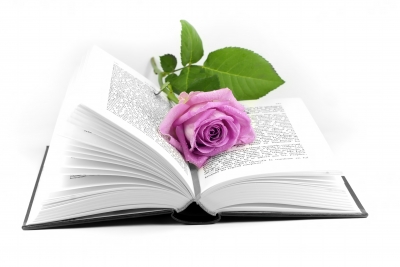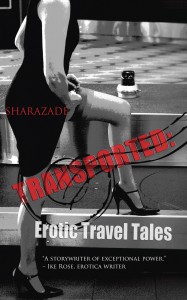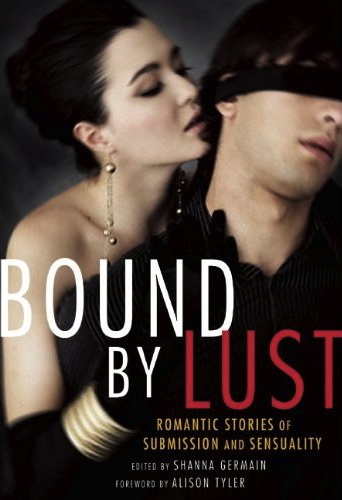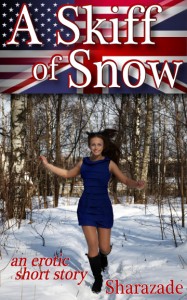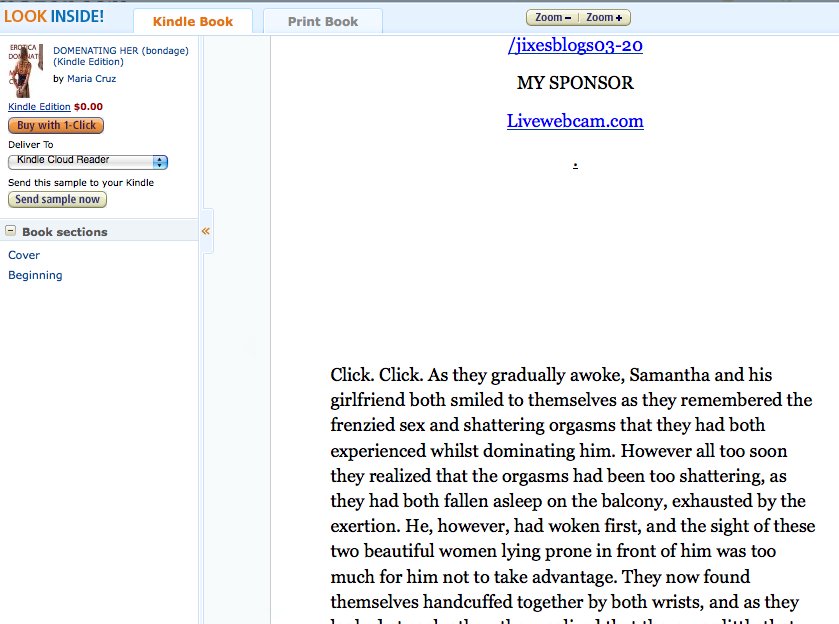
This is a post about cheating and deception. That’s the juicy stuff. But in order to get there, I’m going to put in a bit of background. I promise you, though, we’ll get to juicy stuff!
Books are not quite like many other consumer products. If you buy a refrigerator and you really like it, you’re not likely to go out and get a half dozen more. But if you buy a book and you really enjoyed reading it, you are likely to buy more — you’d be repeating a pleasurable experience. I think that’s one reason authors (OK, most authors) aren’t competitive with each other. More readers, and more happy readers, means more readers for everyone.
The community of erotica writers I’ve found to be very supportive and helpful. If someone posts a new release or a good review on Facebook or Google+, other authors are quick to “like” it and share the link and write supportive comments. Authors who post questions (To what publishers might I submit a story with elements x, y, and z? What word count constitutes a “novella” and how much should I charge for one? and so on) get helpful answers and encouragement. We are, after all, in the same business, doing the same work, making the same effort.
That last point is important: doing the same work.
Recently, I’ve been trying my hand at publishing. I self-published a short story (very short! so I included a ‘bonus story,’ and priced it cheap), and then I published two titles by another author, James Wood, under my 1001 Nights Press imprint.
One of Mr. Wood’s titles, Taking Jennifer, I enrolled in Amazon’s Kindle Select program. To participate in this program, you need to give Amazon exclusive content; you can’t have the same title currently available anywhere else. A controversial move, on Amazon’s part, for sure. In return, you get essentially two benefits:
• The book is available in the Kindle Lending Library, which means that members of Amazon’s Prime program can borrow it free. Prime members are allowed to borrow a whopping one title free each month. Authors are paid a fee per borrow that’s calculated in this way: Amazon has a pot of money ($500,000 for December 2011, and $700,000 for January 2012) that is divided equally among all borrowed titles. The price per borrow for December 2011 came out to $1.70. That’s a good deal if your book normally costs .99, and not a good deal if your book normally costs 9.99; however, it is (some feel) increased visibility in general. (Taking Jennifer normally costs $2.99, resulting in a net to the publisher of about $2.00 minus a few cents for a “delivery charge.”)
• You can offer your book for free for 5 days out of 90. (To be in the Kindle Select program, you must enroll in renewable 90-day segments.) While your book is free, obviously you don’t earn anything for a download — but since people like free, it’s likely that your book will be downloaded a lot. This could lead to sales of other titles, if people liked the one they tried. It can lead to reviews, and most importantly, it will raise your visibility in Amazon’s system. You might start showing up tied to other bestsellers in the “Customers who purchased X also bought Y” pages, and that’s very helpful. Many (although not all) authors report increased sales after their book has been available for free.
So, I put Taking Jennifer up for free for two days in December, and sat back to watch the results. (Note: This is one of the fun things about self-publishing, for the mildly obsessive — you can keep refreshing and checking your stats!)
Free books show up in a separate list from paid books, of course, which is only fair. Jennifer did pretty well, I think — at the end of promotion, it reached #21 in free erotica on the US Amazon site, and #3 on the UK site.

Check out the #3 title — that’s mine — and then the #1 title. Naturally, I was curious to see who was doing better; particularly because of the title. I wouldn’t mind at all being ‘beaten,’ if you care to see it that way, by a book called My Sister’s Best Friend, but … My Sister Bestfriend? Really? And with that cover image? It’s not even the right shape, and there’s no title or author name or anything. Like the author didn’t even try. My cover image was done by Shaina Richmond, author of the popular Safe with Me series. I don’t think it was enormously difficult, but still, it took some time and negotiation and playing around with fonts (and talent) to get it just right. Oh, and obviously I had to purchase the cover image. That’s the process most authors go through: You select an image from a stock image site, you pay to download it, and you add a title and author name. Some people use more than one image, or use image-editing software to enhance the picture. And … you can pretty much tell when someone hasn’t gone through those steps.
So, I clicked on the book, and then to the author page for Maria Cruz. Wow, lots of erotica books, which all had the same sort of, um, unprofessional-looking covers (even one spelled wrong: Domenating Her). All erotica, and … one horror book. That seemed out of place, so I clicked on it, and then on “Look Inside” and read a bit. It was, well, it was pretty good prose. Very good prose. Almost … suspiciously good prose. So I googled a bit. Ah. It was Bram Stoker’s Dracula (though the cover was lifted from a graphic novel site).
Now, Dracula is actually in the public domain now. However, under the terms of the Kindle Select program, public domain works that you re-publish are not allowed — remember that exclusivity clause?
It’s been my experience that people rarely cheat only once. So I started clicking on her other titles, the erotica ones. Surprise, surprise. They were all lifted from other places as well, predominately from the Literotica site. Now, it’s possible — highly unlikely, but still possible — that Maria Cruz was actually the true author of these 40+ titles on Literotica from back in 2006, and had just wanted, for her own reasons, to use 40 separate pen names. No law against that. But there was still Amazon’s policy that books in the Kindle Select program (as Maria Cruz’s were) couldn’t be available anywhere else (like Literotica), whether you’d written them yourself or not.
So that pissed me off. Other authors in Amazon’s program were abiding by the terms; they were playing fair. And this one wasn’t. And how was her book so high in the rankings? By being downloaded a lot, sure … but why was something with a crap cover and poor grammar being downloaded so much? I will let readers draw their own conclusions, but … I think there are ways, if one is skilled with computer-y matters, to essentially stuff the ballot box, if you know what I mean.
Was Maria Cruz hurting other authors? Well, yes and no. As I said before, if one author is successful, it doesn’t at all mean that another author won’t be successful. Authors don’t compete in that sense. But in the “game” of sales rankings, yes — Maria’s being at #1 means that someone else is not at #1, and so on down the line, and sales rankings mean increased visibility, and that visibility helps all of your books. And if Maria’s books were being borrowed, then she was getting a slice of Amazon’s half-million dollar pie. At one point in December, Maria Cruz posted on the Amazon Kindle Direct Publishing forum that she’d had over 700 borrows in December (Taking Jennifer had 12).
I wound up telling this story to investigative journalist Adam Penenberg, who wrote about it for Fast Company; as he noted, Maria Cruz was far from the only erotica pirater selling on Amazon, and the piracy problem went beyond erotica. But I think erotica is particularly vulnerable because of sites like Literotica where authors post stories for free. They don’t register copyrights (which would cost them $35), and they pretty much all use pen names. Maria Cruz was lifting stories posted over 5 years ago; it’s quite possible the original authors weren’t even writing anymore, let alone scouring the Net to see if their work had been reposted.
Is there a solution? Currently, it’s pretty easy to upload a book to Amazon. You open an account, you format your book, and you upload it. Amazon does require a bank account and tax ID number; perhaps Amazon can do something at their end, then, as long as they are aware a problem exists. But how would they know? They don’t check each title. (Perhaps they should?)
But definitely, buyers should check. Before you purchase a book from Amazon, check the “Look Inside” feature (well, you would anyway, wouldn’t you?), and then google a phrase or two. Generally, a string of seven words in between quotation marks is enough to pull up a matching text, if one exists (although not with stock phrases such as “Once upon a time” and the like.) Some pirates will change proper names, and might make minor changes such as “brother” to “step-brother,” but if you take some innocuous middle sentence, that should suffice. Go ahead and try it with text from the screen shot (from Ms. Cruz’ Domenating Her). Put in the first few words: “Click. Click. As they gradually awoke” and see what comes up.
Also, at least with erotica, be suspicious of cover images that don’t really look like covers:
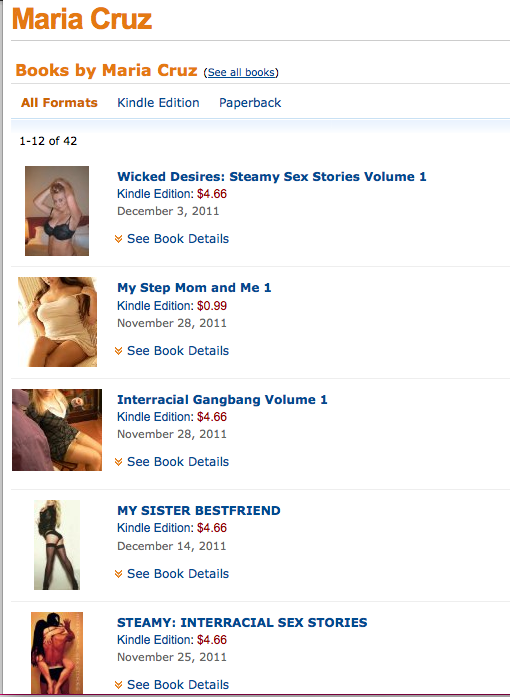
And finally… if you do find a book on Amazon that is clearly pirated, please report it! It seems to me (though it’s not entirely clear) that the link for reporting a copyright violation is intended to be for people whose own work has been stolen. Still, though, you could certainly report it there. Another place to report it would be as “inappropriate content” and then from the drop-down menu as “violates the Amazon Kindle terms of service.” In the Comments section, you could paste in the link to the same work attributed to another author.

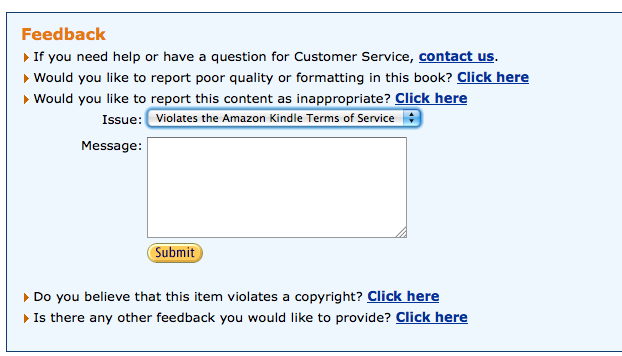
Some people still look down on self-published books, thinking that they’re of low quality and poorly edited. And if that’s the case, then that will come out eventually in the reviews. And people have different tastes, of course. But every book up there should be the author’s own work. THAT we have the right to demand, authors and readers alike.
* * * * *













